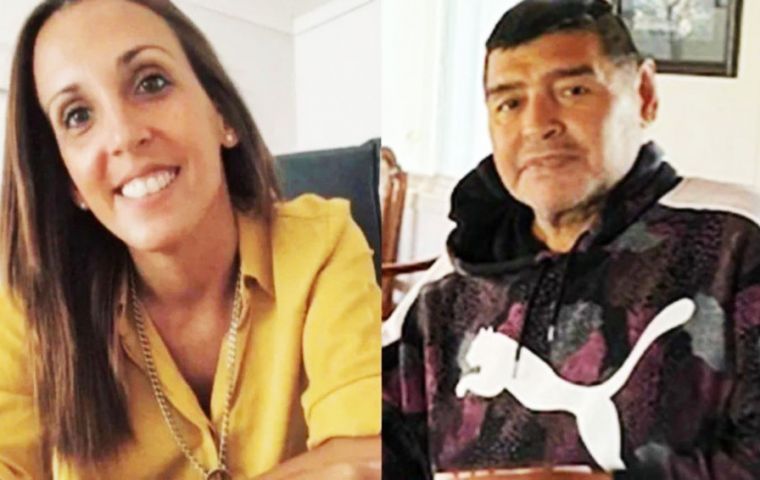MercoPress. South Atlantic News Agency
Maradona's death could have been prevented, court doctors say
 “Cosachov froze at the foot of the bed,” the report stated
“Cosachov froze at the foot of the bed,” the report stated Medical experts appointed by the Office of the Prosecutor investigating the death of Diego Armando Maradona Friday concluded the Argentine football star lacked proper health care assistance and that he might have survived under different conditions.
“The actions of the health team that cared for Diego Armando Maradona were inadequate, deficient and reckless,“ the experts reported, hinting that Maradona would have had a better chance of survival had he stayed hospitalized longer instead of being brought home.
Topping the list of professionals who allegedly endangered their patient's health were GP Leopoldo Luque and psychiatrist Agustina Cosachov, who left his survival up ”to chance.“ The consulting experts agreed Maradona ”was not in full use of his mental faculties, nor in a position to make decisions about his health,“ when he left the Olivos Clinic.
The 70-page report also mentions that Maradona ”began to die at least 12 hours before“ the moment he was found lifeless in his bed. The doctors believed he suffered a ”prolonged agonizing period.”
A formal indictment against the professionals involved is likely to ensue, but the exact nature of the charges is yet to be decided by the prosecution.
Maradona died on November 25, aged 60, alone in his bed in a rented house in a private neighbourhood of Tigre, just outside the Autonomous City of Buenos Aires (CABA), where he was recovering after an operation on his head, and where he was supposedly under home hospitalization. But according to the experts' report he “would have had a better chance of survival” had he had adequate hospitalization and in a multipurpose healthcare centre.
”Considering (...) his poor general condition, he should have continued his rehabilitation and interdisciplinary treatment in an appropriate institution,“ the medical panel insisted. The experts indicated that Maradona ”was not in full use of his mental faculties, nor in a position to make decisions about his health.“
According to Luque, Maradona had insisted on leaving the clinic and had refused to be taken to another health centre. But the experts agree that ”the signs of life risk that he presented were ignored“ and the nursing care in these last weeks ”is plagued with deficiencies and irregularities.“
”The treating medical team fully and thoroughly represented the possibility of the fatal outcome concerning the patient, being absolutely indifferent to that question, not modifying their behaviours and medical / care plan drawn up, maintaining the aforementioned harmful omissions, abandoning 'to chance' the state of health of the patient,“ the report said.
In addition to Luque and Cosachov, Psychologist Carlos Díaz, nurses Dahiana Gisela Madrid and Ricardo Almirón, Doctor Nancy Forlini and Coordinating Nurse Mariano Perroni are all under investigation.
“Maradona began to die at least 12 hours before 12:30 on November 25 last. He presented unequivocal signs of a prolonged agonizing period, which is why we conclude that the patient was not properly controlled from 0.30 am on the day of his death,” the experts wrote.
“It can be inferred from the documentary that was analyzed by this Interdisciplinary Medical Board that the treating medical team fully and thoroughly represented the possibility of the fatal outcome concerning the patient, being absolutely indifferent to that question, not modifying their behaviours and medical / care plan traced, maintaining the aforementioned harmful omissions, abandoning the patient's state of health to 'chance',” the 23-item report went on.
Maradona lived for two weeks in a rented house in the San Andrés neighbourhood, in the area known as Villanueva, in Benavídez, Tigre. On November 11, he had left the Olivos clinic, where he was operated on for a subdural hematoma on his head. The operation was on Tuesday the 3rd of that month. Diego died on November 25.
It was recorded that Maradona lacked a proper medical discharge and that health care provider Swiss Medical had proposed to continue with a psychiatric, clinical and rehabilitation and toxicological treatment under the modality of hospitalization in a rehabilitation centre, which the family turned down.
Luque and psychiatrist Agustina Cosachov were defined as the ”treating medical team“ and it was argued that the professionals ”prescribed, and the family accepted, the monitoring and home medical care of the patient”, which they requested from Swiss Medical with nursing home care and therapeutic accompaniment.”
But “the nursing care during the stay in the Tigre house, after leaving the Olivos Clinic, is plagued by deficiencies and irregularities. Maradona did not present correct controls and assistance from the medical care, nursing and therapeutic companions, neither in time nor in form, as dictated by the regulations of good practices. There are no records of psychological care at home.”
And “there were neither the elements nor the people trained to perform advanced CPR, nor were the manoeuvres started with the necessary speed. Cosachov froze at the foot of the bed. From the arrival of plastic surgeon Colin Campbell, a resident of the place (neighbourhood), it is he who commands the resuscitation until the arrival of the mobile emergency services. From that moment on, we consider the action to be correct taking into account the capabilities and availability of available elements.”




Top Comments
Disclaimer & comment rulesCommenting for this story is now closed.
If you have a Facebook account, become a fan and comment on our Facebook Page!